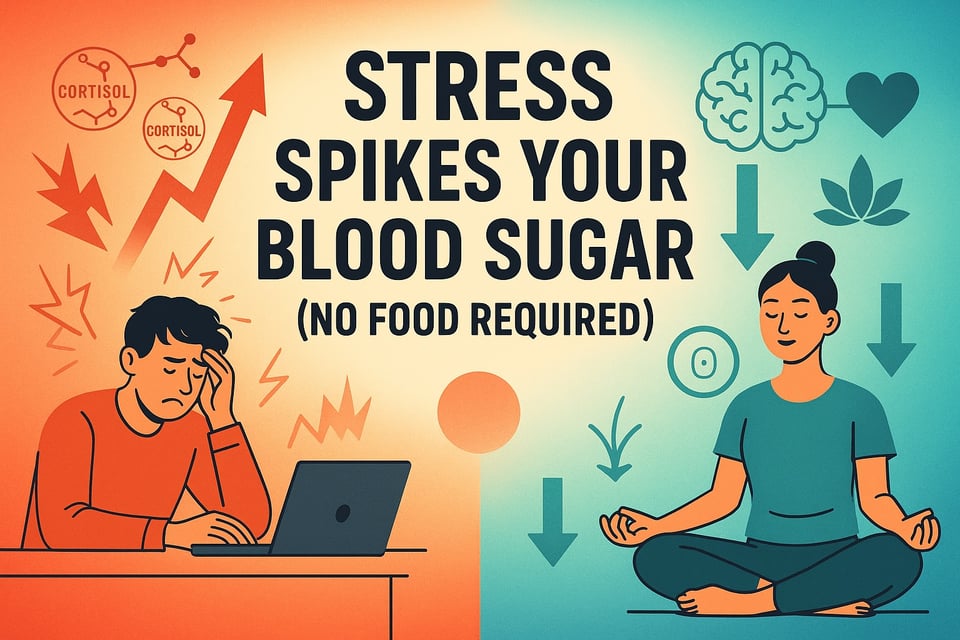🧠 The Glucose-Stress Connection: Why Your Mind Can Spike Your Sugar

You’ve nailed your meals.
Balanced plate? ✅
Post-meal walk? ✅
No sugary slip-ups? Gold star.
Yet your CGM flashes a sudden spike mid-afternoon—when you haven’t even eaten a bite.
What gives?
Rewind. What were you doing then? Nervously prepping for that big presentation? Stuck in soul-crushing traffic, heart pounding at yet another red light?
Bingo. That’s your culprit.
Before we dive in…
Catching sugar spikes early can save you years of medication and medical bills later. With GlucoSpike AI, just snap your meal and see what’s really affecting your blood sugar.
Available on the App Store and Play Store.
🧪 The Stress-Glucose Link: Cortisol in Action
Your body’s wired for survival, but it’s running on outdated software.
In prehistoric times, stress meant danger—like a saber-toothed tiger. To fight or flee, your body flipped a switch:
Released cortisol (your stress hormone), which...
Prompted your liver to dump stored glucose into your bloodstream for instant energy.
Fast forward to today. No tigers—just emails, deadlines, and doom-scrolling.
Yet your body reacts the same: cortisol surges, glucose spikes—food optional.
Think of cortisol like a false fire alarm in your metabolic headquarters. It blares “Emergency!” and floods your system with fuel, even if you’re just sitting at your desk.
🧬 Why It Hits Hard (Even If You’re Not Diabetic)
Stress-driven glucose spikes aren’t harmless. Over time, they can:
🚧 Build insulin resistance—making your cells less responsive to sugar.
🔁 Trigger energy crashes—leaving you foggy and fatigued.
🧠 Fuel a vicious cycle—unstable glucose increases anxiety, which raises cortisol, which spikes glucose. Rinse, repeat.
And cortisol has side gigs:
Cranks up cravings (midnight munchies, anyone?)
Wrecks your sleep (hello, next-day spike)
Slows digestion (making CGM readings even messier)
A 2023 review in The Journal of Endocrinology linked chronic stress to prediabetes—even in active, otherwise healthy people. So yes, your diet might be flawless—but unchecked stress is like a hacker in your metabolic code.
What’s your sneakiest stressor—work emails, traffic, or social media spirals?
Hit reply and let’s trade notes.
🧘♀️ Tame the Spike: Science-Backed Strategies
Ready to reboot? Here’s what actually works:
Breathe Deeply and Deliberately
Long exhales activate your “rest and digest” mode, cutting cortisol (per Psychoneuroendocrinology). Try 4-7-8 breathing: inhale for 4, hold for 7, exhale for 8. Two minutes = nervous system reset.Move Mindfully
Skip HIIT when you’re stressed—it can backfire. Go for a walk, stretch, or have a kitchen dance party. These burn off excess glucose and calm the system.Prioritize Sleep Like a Pro
Skimpy sleep = cortisol overload. Build wind-down rituals: dim the lights, ditch screens an hour before bed, and stick to a schedule.Label and Diffuse the Stress
Saying “I’m overwhelmed by this deadline” lowers the fight-or-flight response. Journal, vent, or just name it.Hunt Hidden Triggers
Too much caffeine? Non-stop notifications? Overpacked calendar? These stealth stressors stack up. Audit and adjust.
🧠 The Bottom Line
Glucose isn’t just about food—it’s a mirror to your lifestyle.
Stress isn’t just mental noise—it’s a stealthy saboteur hijacking your blood sugar.
Nail your nutrition? Awesome. But tame your cortisol, and you unlock next-level stability.
Next time your CGM spikes out of nowhere, ask: "What’s eating at me?"
Because sometimes, the real spike starts in your head.